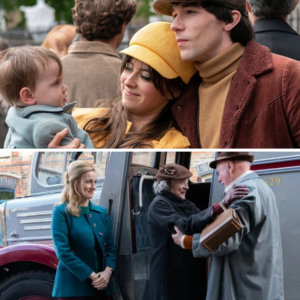Good Fortune, the upcoming supernatural comedy directed by Aziz Ansari in his feature directorial debut, promises to blend laugh-out-loud humor with a poignant exploration of wealth and well-being. Set to premiere at the Toronto International Film Festival in September 2025 and hit theaters on October 17, 2025, the film features a stellar cast led by Keanu Reeves as Gabriel, a bumbling guardian angel. Through a chaotic body-swap between a struggling gig worker, Arj (Aziz Ansari), and a billionaire venture capitalist, Jeff (Seth Rogen), Good Fortune tackles the age-old question: Can money truly buy happiness? With sharp satire and heartfelt moments, the film offers a nuanced perspective on economic disparity and human connection in modern America.
A Supernatural Setup with a Comedic Twist
The film’s premise is a clever fusion of supernatural whimsy and classic body-swap comedy. Gabriel, a low-tier guardian angel with comically small wings, yearns for a promotion in the celestial hierarchy. His usual tasks—preventing minor mishaps like texting while driving or choking on food—feel trivial, prompting him to seek a grander purpose. He sets his sights on Arj, a gig economy worker whose life epitomizes financial struggle. Arj’s lowest moment comes when he falls asleep in a Denny’s booth, only to find his car being towed upon waking. Convinced that wealth breeds misery, Gabriel orchestrates a body-swap between Arj and Jeff, a self-absorbed billionaire, to prove that money cannot buy happiness.
The plan, however, goes spectacularly awry. Arj thrives in Jeff’s luxurious world, using wealth to solve his practical problems—paying bills, fixing his car, and living comfortably—while refusing to switch back. Jeff, meanwhile, flounders in Arj’s precarious existence. As punishment for his blunder, Gabriel is stripped of his wings and banished to Earth as a mortal, forced to room with the displaced Jeff while navigating the chaos of his failed intervention. This setup, both absurd and insightful, lays the foundation for the film’s exploration of money’s role in happiness.
Satire on Wealth and Class Disparity
At its core, Good Fortune is a satirical commentary on class divides in contemporary society. Aziz Ansari, known for his incisive humor in Parks and Recreation and Master of None, uses the body-swap to highlight the stark contrast between the gig economy’s instability and the ultra-wealthy’s extravagance. Arj’s rapid adaptation to Jeff’s life challenges Gabriel’s naive belief that wealth inherently leads to discontent. Instead, the film suggests that money can alleviate survival stressors, allowing Arj to focus on personal fulfillment rather than scraping by.
Conversely, Jeff’s struggle in Arj’s world exposes the fragility of privilege without resources. The humor arises from this inversion: Arj’s pragmatic use of wealth undercuts the cliché that money corrupts, while Jeff’s disorientation reveals how disconnected the elite can be from everyday realities. Through this lens, Good Fortune critiques a society where financial security is a luxury, offering a fresh take on the body-swap trope seen in films like Trading Places or Freaky Friday.
Keanu Reeves as the Heart of the Comedy
Keanu Reeves’ casting as Gabriel is a masterstroke, leveraging his public persona as a kind-hearted, almost saintly figure. Famous for action roles in The Matrix and John Wick, Reeves brings a gentle, understated charm to this comedic turn. Gabriel’s tiny wings and earnest demeanor symbolize his junior angelic status, while his beige trench coat and suit nod to his Constantine (2005) role, where he played opposite an angelic Gabriel—now, he embodies the angel himself.
Reeves’ performance, glimpsed in trailers, blends deadpan delivery with physical comedy. As Gabriel adjusts to human life post-banishment, scenes of him wrestling with fast food, dancing awkwardly, or grappling with mundane annoyances highlight his fish-out-of-water struggle. These moments mirror the film’s broader question: What constitutes true happiness when stripped of divine powers or material wealth? Reeves’ real-life dedication adds irony to his role; during filming, he fractured his kneecap in a cold plunge scene but continued on crutches, echoing Gabriel’s propensity for well-meaning but clumsy errors.
Aziz Ansari’s Directorial Vision
Stepping behind the camera for his first feature, Aziz Ansari infuses Good Fortune with personal touches drawn from his stand-up roots and desire to revive theatrical R-rated comedies. After the suspension of his previous project, Being Mortal, Ansari pivoted to this film, inspired by Barbie (2023)’s success in drawing audiences to original cinema. As both director and star, Ansari crafts Arj as a relatable everyman whose transformation from pauper to prince exposes the film’s central irony: money may not buy happiness, but it sure makes life easier.
Ansari’s collaboration with Seth Rogen, a longtime friend, was seamless. Rogen joined the project hours after reading the script, contributing ideas like the sauna and cold plunge scenes that led to Reeves’ injury. This camaraderie translates onscreen, enhancing the film’s comedic chemistry.
A Stellar Ensemble Cast
The supporting cast elevates Good Fortune’s narrative depth. Seth Rogen, as Jeff, embodies oblivious privilege, his stoner-comedy roots (Pineapple Express, This Is the End) lending humor to his body-swapped bewilderment. Keke Palmer, fresh off Nope and Hustlers, adds vibrancy and emotional resonance to her role, grounding the chaos with heart. Sandra Oh, playing Martha, Gabriel’s dry-witted angelic superior, delivers sharp quips honed in Grey’s Anatomy and Killing Eve. Martha’s assignment of the ill-fated task to Gabriel sets the plot in motion, her exasperation adding a layer of celestial bureaucracy that mirrors earthly inefficiencies.
Production Journey and Cultural Buzz
Good Fortune’s production reflects Ansari’s resilience. Announced in April 2023, filming was delayed by Hollywood strikes but resumed in early 2024. Set photos of Reeves in angelic garb on Los Angeles rooftops fueled early buzz, amplified by Lionsgate’s May 2025 trailer release. Critics at CinemaCon 2024 praised the film’s blend of Trading Places-esque satire and Scrooged-style heart, noting its potential to revive the theatrical comedy slump.
The trailer’s viral moments—Gabriel’s rooftop plea for bigger duties, the chaotic swaps, and Reeves’ wingless bewilderment—have sparked online discussions. Fans draw parallels between Reeves’ real-life philanthropy and Gabriel’s earnestness, adding a meta layer to the film’s appeal.
Thematic Depth: Money vs. Connection
Thematically, Good Fortune echoes supernatural comedies like Wings of Desire (1987) or City of Angels (1998), where angels grapple with human existence. Here, Gabriel’s fall is comedic punishment for hubris, his “silly mistake” underscoring how good intentions can backfire. The body-swap critiques capitalism: Arj’s success in Jeff’s world challenges the notion that wealth corrupts, instead framing it as a practical fix for survival issues. Yet, the film’s resolution—without spoiling—suggests true fortune lies in human connections, not cash, balancing satire with warmth.
This duality makes Good Fortune more than slapstick. It’s a commentary on inequality, wrapped in absurd humor, that resonates with audiences navigating economic uncertainty. By subverting the “money can’t buy happiness” cliché, the film invites reflection on what happiness means in a material world.
A Cinematic Gem in the Making
As its release nears, Good Fortune stands poised to be a comedic gem, blending star power, sharp writing, and a profound message. Reeves’ fanbase, Ansari’s wit, and an ensemble delivering punchy performances position the film to fill theaters like Barbie did. Expectations are high: Will Gabriel reclaim his wings? How will the chaos resolve? The film promises heart amid the laughs, affirming that while money eases burdens, happiness stems from relationships.
In conclusion, Good Fortune offers a divine cinematic experience, using its supernatural comedy to probe whether money can buy happiness. Its answer—nuanced, funny, and deeply human—makes it a must-see for 2025.





